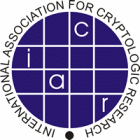TCC 2011 Accepted Papers
| Secure Two-Party Computation via Cut-and-Choose Oblivious Transfer
|
Yehuda Lindell; Benny Pinkas
| (Nearly) Round-Optimal Black-Box Constructions of Commitments Secure Against Selective Opening Attacks
|
David Xiao
| Round-Optimal Password-Based Authenticated Key Exchange
|
Jonathan Katz; Vinod Vaikuntanathan
| Black-Box Circular-Secure Encryption Beyond Affine Functions
|
Zvika Brakerski; Shafi Goldwasser; Yael Tauman Kalai
| Completeness Theorems with Constructive Proofs for Finite Deterministic 2-Party Functions
|
Daniel Kraschewski; Jörn Müller-Quade
| Security Amplification for the Cascade of Arbitrarily Weak PRPs: Tight Bounds via the Interactive Hardcore Lemma
|
Stefano Tessaro
| Tight Bounds for Classical and Quantum Coin Flipping
|
Esther Hänggi; Jürg Wullschleger
| General Hardness Amplification of Predicates and Puzzles
|
Thomas Holenstein; Grant Schoenebeck
| A Zero-One Law for Secure Multi-Party Computation with Ternary Outputs
|
Gunnar Kreitz
| Identity-Based Encryption Secure Against Selective Opening Attack
|
Mihir Bellare; Brent Waters; Scott Yilek
| On the Complexity of Non-Adaptively Increasing the Stretch of Pseudorandom Generators
|
Eric Miles; Emanuele Viola
| Limits on the Stretch of Non-Adaptive Constructions of Pseudo-Random Generators
|
Josh Bronson; Ali Juma; Periklis A. Papakonstantinou
| Limits on the Power of Zero-Knowledge Proofs in Cryptographic Constructions
|
Zvika Brakerski; Jonathan Katz; Gil Segev; Arkady Yerukhimovich
| Input Locality and Hardness Amplification
|
Andrej Bogdanov; Alon Rosen
| Perfectly Secure Oblivious RAM Without Random Oracles
|
Ivan Damgård; Sigurd Meldgaard; Jesper Buus Nielsen
| On the Impossibility of Blind Signatures From One-Way Permutations
|
Jonathan Katz; Dominique Schröder; Arkady Yerukhimovich
| Unconditional and Composable Security Using a Single Stateful Tamper-Proof Hardware Token
|
Nico Döttling; Daniel Kraschewski; Jörn Müller-Quade
| Achieving Leakage Resilience Through Dual System Encryption
|
Allison Lewko; Yannis Rouselakis; Brent Waters
| Homomorphic Encryption: from Private-Key to Public-Key
|
Ron Rothblum
| On Black-Box Separations among Injective One-Way Functions
|
Takahiro Matsuda; Kanta Matsuura
| Parallel Repetition for Leakage Resilience Amplification Revisited
|
Abhishek Jain; Krzysztof Pietrzak
| Practical Adaptive Oblivious Transfer from Simple Assumptions
|
Matthew Green; Susan Hohenberger
| Limits of Computational Differential Privacy in the Client/Server Setting
|
Adam Groce; Jonathan Katz; Arkady Yerukhimovich
| On the Black-Box Complexity of Optimally-Fair Coin Tossing
|
Dana Dachman-Soled; Yehuda Lindell; Mohammad Mahmoody; Tal Malkin
| PCPs and the Hardness of Generating Synthetic Data
|
Jonathan Ullman; Salil Vadhan
| Functional Encryption: Definitions and Challenges
|
Dan Boneh; Amit Sahai; Brent Waters
| Correlated-Input Secure Hash Functions
|
Vipul Goyal; Adam O'Neill; Vanishree Rao
| After-the-Fact Leakage in Public-Key Encryption
|
Shai Halevi; Huijia Rachel Lin
| Signatures Resilient to Continual Leakage on Memory and Computation
|
Tal Malkin; Isamu Teranishi; Yevgeniy Vahlis; Moti Yung
| Bringing People of Different Beliefs Together to do UC
|
Sanjam Garg; Vipul Goyal; Abhishek Jain; Amit Sahai
| One-time Computable Self-Erasing Functions
|
Stefan Dziembowski; Tomasz Kazana; Daniel Wichs
| Towards Privacy for Social Networks: A Zero-Knowledge Based Definition of Privacy
|
Johannes Gehrke; Edward Lui; Rafael Pass
| Exploring the Limits of Common Coins Using Frontier Analysis of Protocols
|
Hemanta K. Maji; Pichayoot Ouppaphan; Manoj Prabhakaran; Mike Rosulek
| Concurrent Non-Malleable Zero Knowledge with Adaptive Inputs
|
Huijia Rachel Lin; Rafael Pass
| Towards Non-Black-Box Lower Bounds in Cryptography
|
Rafael Pass; Wei-Lung Dustin Tseng; Muthuramakrishnan Venkitasubramaniam
|

